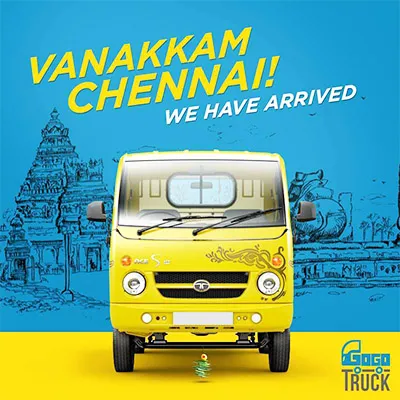Chennai-based mini truck aggregator GoGo Trucks targets intra-city logistics, to launch driver facing app in Tamil
After cabs, inter and intra-city trucks seem to be the next logical market for both Indian entrepreneurs and VCs to go after in the logistics sector. The sector is unorganised to an extent; people and truck operators face issues related to discovery, accessibility, and clarity on price points. A startup in Chennai, GoGo Truck, aims to go after the intra-city truck segment.

Idea to execution
The idea for the startup came from a particular intra-city shipment issue faced by one of the founders in Chennai. Senthil Kumar, one of the co-founders described the incident
A few months ago, we had to relocate our fridge. We searched locally and tried to find the nearest transporter, but it took two hours to find one and arrange a truck. Moreover, each truck driver we met quoted different prices for the same destination.
The founders quickly understood that the market was controlled by the ‘drivers’ and customers had no transparency on the actual price points. The drivers, on the other hand, had idle times of about 50 to 60 per cent while on their jobs. The co-founders, Senthil Kumar and Vasister, soon took up the challenge of solving the problem, both for the consumers and truck owners. And that is how GoGo Trucks came into the market.
The team consists of seven people who handle various roles and responsibilities. Senthil has a background in IT, and heads the team. Vasister is a business graduate with a background in supply chain management and IT. Ramamoorthy manages the web application team and the Android developers.

GoGo Truck had their beta launch in February, 2015, and then officially launched in March, 2015. They started out with 20 Tata Ace Mini Trucks and now have a fleet of 75 trucks (owner cum drivers) which include trucks like Tata Ace, Ashok Leyland Dost and Tata 407 spread across Chennai. They claim to be growing at about 100 per cent, month-on-month, and have completed about 250 orders in the month of June.They found that getting the drivers on board was not very challenging as there were many who did not get frequent orders - both due to lack of discoverability and haggling over price. From a safety standpoint, GoGo Truck ensures that all drivers on board go through the necessary police verification process.
Customers can book mini trucks using the customer facing web application they have developed. The nearest truck drivers receive the trip details through SMS, and the interested drivers can choose to accept the order. The drivers then contact the customers, arrive at the pickup up point, and deliver the goods to the destination. GoGo Trucks did have a mobile app but it was developed by a vendor and had some usability issues. They have now set up an in-house development team and will be re-launching the app with additional functionalities soon.
Business Model and Market size
GoGo Trucks shares the revenue on each transaction that takes place through their platform with the driver. As of now, customers pay in cash after the delivery is completed, to the driver. They are working on an online payment gateway to facilitate payments and plan to offer incentives to customers who book and pay online through their mobile app.
They are making use of both online and offline avenues to market their product. In the online space they are running campaigns on Quikr and OLX and offer discounts on delivery requests placed through them. To augment offline promotions they distribute flyers at industrial and consumer exhibitions to reach their target audience.
So far, about 60 per cent of their customers have come from the B2B segment, while the remaining 40 per cent is B2C. They also run referral programs that helped them reach out to new customers. They have tied up with FMCG and food delivery companies on long term delivery contracts. Additionally, they offer monthly/weekly plans, and even customized solutions for B2B customers.Vasister says,
The logistics market is enormous and there is room for many players in this segment. There are more than seventy thousand mini trucks running in Chennai and they are invariably used for last-mile deliveries. With the boom in e-commerce, demand for quality and timely service has become critical. This is a great opportunity for us. During daytime almost 75 per cent of the intra-city logistics is done through mini trucks; right from business deliveries to house shifting or relocation.
There are many players, both local and international, who are competing in this segment. Amongst them some of the notable players are-Gogovan from HongKong, Bengaluru based Blowhorn, Shippr, LOTrucks, Zaicus and theKarrier; Mumbai based ThePorter and Quifers; Delhi based truckmandi. Return Trucks on the other hand provides inter-city service. There is a lot of interest in this sector; luckily, from the investor side as well. Blowhorn had raised a seed fund from Unitus Feed Fund in November, 2014 while theKarrier, raised Rs 1.5 crore from Sol Primero and others in May 2015.
Their main aim of GoGo Trucks is to connect transporters, mini truck drivers and customers, and provide a 24x7 service. They currently charge Rs.16 per km, though they do tack on additional charges for making night time deliveries.
Future plans
GoGo Trucks is presently self-funded. For the moment the company operates only in Chennai but it will soon make a foray into other markets as well. They are working on improving their web interface, and in the future, users will able to track the trucks carrying their goods in real time. They are also working on a driver facing mobile app in Tamil, both to make it easier for the drivers to accept orders and to facilitate navigation across delivery destinations in Chennai.
Website: www.gogotruck.in







